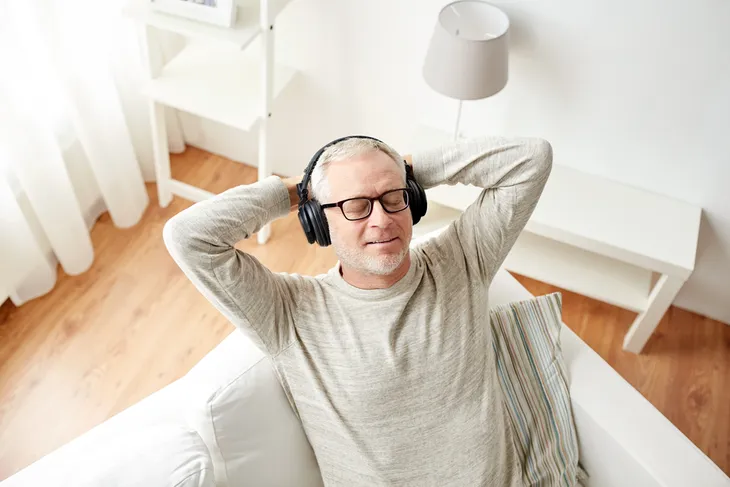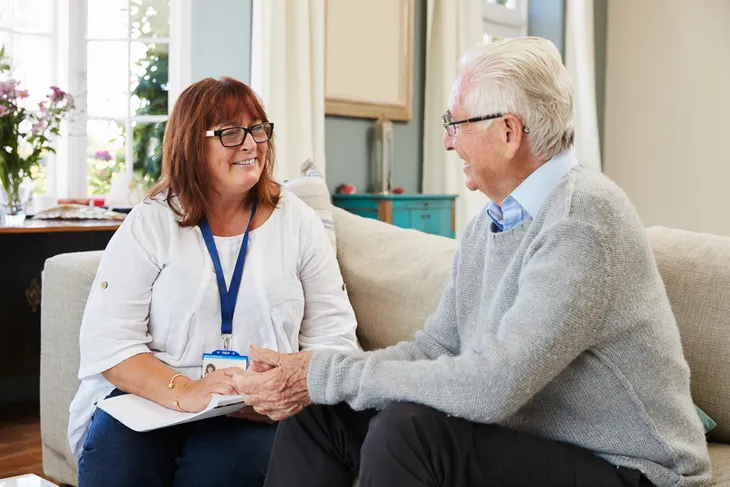While many seniors have good mental health some are at risk of developing mental disorders. The World Health Organization (WHO) says, “Approximately 15% of adults aged 60 and over suffer from a mental disorder.” This may be due to reduced mobility, chronic pain, and other health problems. Some seniors even feel lost and without purpose after retirement. All of these factors can result in anxiety, depression, and the feeling of isolation, loneliness.
The good news is there are ways seniors can be proactive and take charge of their mental health. From engaging in relaxing activities to getting regular exercise, and staying socially connected here are 10 ways seniors can enhance their mental health!
Want senior content delivered straight to your inbox? Sign up for our exclusive email list and receive articles and news on diet & nutrition, fitness, and mental health dedicated specifically to our senior audience!
Get Active
There are many benefits of regular exercise for seniors. The U.S. National Library of Medicine says, “Exercise improves mental health by reducing anxiety, depression, and negative mood and by improving self-esteem and cognitive function.” They also state that physical exercise can help relieve symptoms like low-self esteem and social withdrawal.
But physical activity isn’t only good for the mind. It’s a great thing to do to take care of your body too. This will help prevent falls and to keep your bones, joints, and muscles strong and healthy. If you’re not sure where to start, check out these easy exercises for seniors!
Stay Social
We all know life gets busy but as we get older, things start to slow down so it’s important to keep those social connections. This is because loneliness and the feeling of isolation can lead to depression and mental decline.
Thankfully there are many ways you can stay social. If you’re tech-savvy you can stay connected through social media and you may even be able to reconnect with old friends you haven’t talked to in years. You can also schedule regular coffee or dinner dates, write letters, or even pick up the phone. There are endless ways to stay socially stimulated which will do wonders for your mental health.
Stay Connected To Family
Just like staying socially active with friends, it’s important to stay connected with family. Interacting with your family is a great reminder that you are cared about. This can help reduce the feeling of loneliness, isolation, and can ward off the feelings of depression.
Some great ways to stay connected with family is to book regular visits both in person and over the phone. If you find you get tired easily then keep your visits short. Also, consider one-on-one visits with each family member to maintain a deeper connection.
Get a Pet
Pets can be great companions for seniors. Not only will they keep you from feeling lonely but providing for them will give you a sense of purpose which can be great for your mental health. Further, since pets require physical exercise this could also be a great way to keep you physically active too.
Before getting a pet there are some things you need to be mindful of. For starters, are you financially able to afford a pet and do you have any physical limitations that may interfere in providing the best care for your pet? If you are capable of having a pet then make sure you also determine what age and breed would be best suited for you.
Keep in mind, if you can’t or don’t want to commit to owning a pet there are other ways you can enjoy the benefits of animals. You can always volunteer at a pet shelter, offer to pet sit for a friend, or take a part-time job as a dog walker.
Listen to Music
Listening to music can be excellent free therapy for seniors. John Carpente, the founder and executive director of the Rebecca Center for Music Therapy in New York says, “Listening to music can have strong effects on people’s moods, thinking, and even their physiology…” Certain songs can even remind us of specific memories that can boost brain health.
There are many ways you can listen to music. You can listen alone with headphones, you can play music around the house as you go about your daily tasks and you can even attend a concert. Music has the ability to boost your mood, increase self-esteem, ward off anxiety and fear, can encourage relaxation, and may even help you get better sleep.
There are many great streaming apps where you can make customized playlists that feature songs you love. If you aren’t tech-savvy don’t be afraid to ask a friend or family member to help you!
Volunteer
Volunteering your time is a great way to stay involved with your community after retirement. Plus, getting involved and supporting a worthy cause can help give you purpose which can be incredibly rewarding. As a bonus, volunteering is a great way to stay physically and mentally active and it promotes social stimulation.
There are plenty of organizations that are in need of volunteer support. Find something you feel passionate about or enjoy doing whether that’s sharing your skills with students, or spending time a local soup kitchen. You can find volunteer positions in your local newspaper, through online searches, and you can find them the old fashioned way by asking around.
Start a New Hobby
Now that you have some extra time, what better way to spend it than picking up a hobby. You can try something new or pick up the hobby you already started in your younger years.
Hobbies are great for your mental health because they keep your mind engaged and stimulated. Plus they can be a great mood booster, especially if it’s something you enjoy doing. Some great hobbies include painting, bird watching, knitting, or even learning a new language or instrument! The options are truly endless.
Play Games
Like picking up hobbies, playing games can do wonders for your mental health and your brain. The brain requires stimulation to avoid cognitive decline as we age.
Games can keep your mind engaged because they force you to think. They’re also fun which is a great mood booster. Better yet, if you play a game that requires multiple players you’ll be exercising your brain while socializing, both of which are great for your mental health. Some great games for seniors include puzzles, chess, sudoku, card games, and if you’re tech-savvy there are plenty of online games you can play too.
Yoga and Meditation
There are many great health benefits of meditation and yoga. They are both great practices for reducing anxiety and depression and many seniors also noticed an improvement in their mood when they practiced both.
Furthermore, yoga and meditation are great for relaxation. These types of exercises will help you release tension in your body which in turn creates calmness and helps you relax. Some people even report that they can focus more during the day and they get a better night’s sleep.
Reach Out
Last but surely not least, a great way to take care of your mental health is to never be afraid to reach out. Learning the causes and symptoms of depression is a great start to taking charge of your mental health. Depression can look different in seniors than in other age groups. Never be afraid to talk to someone about your concerns and feelings.
Keep in mind, you don’t have to have depression to seek help. Sometimes speaking to a therapist regularly is a great way to keep your mental health in check. Some senior homes also offer counseling and support groups, and you may even find talking to a family member or a close friend helpful too. The bottom line is, never be afraid of asking for help.













